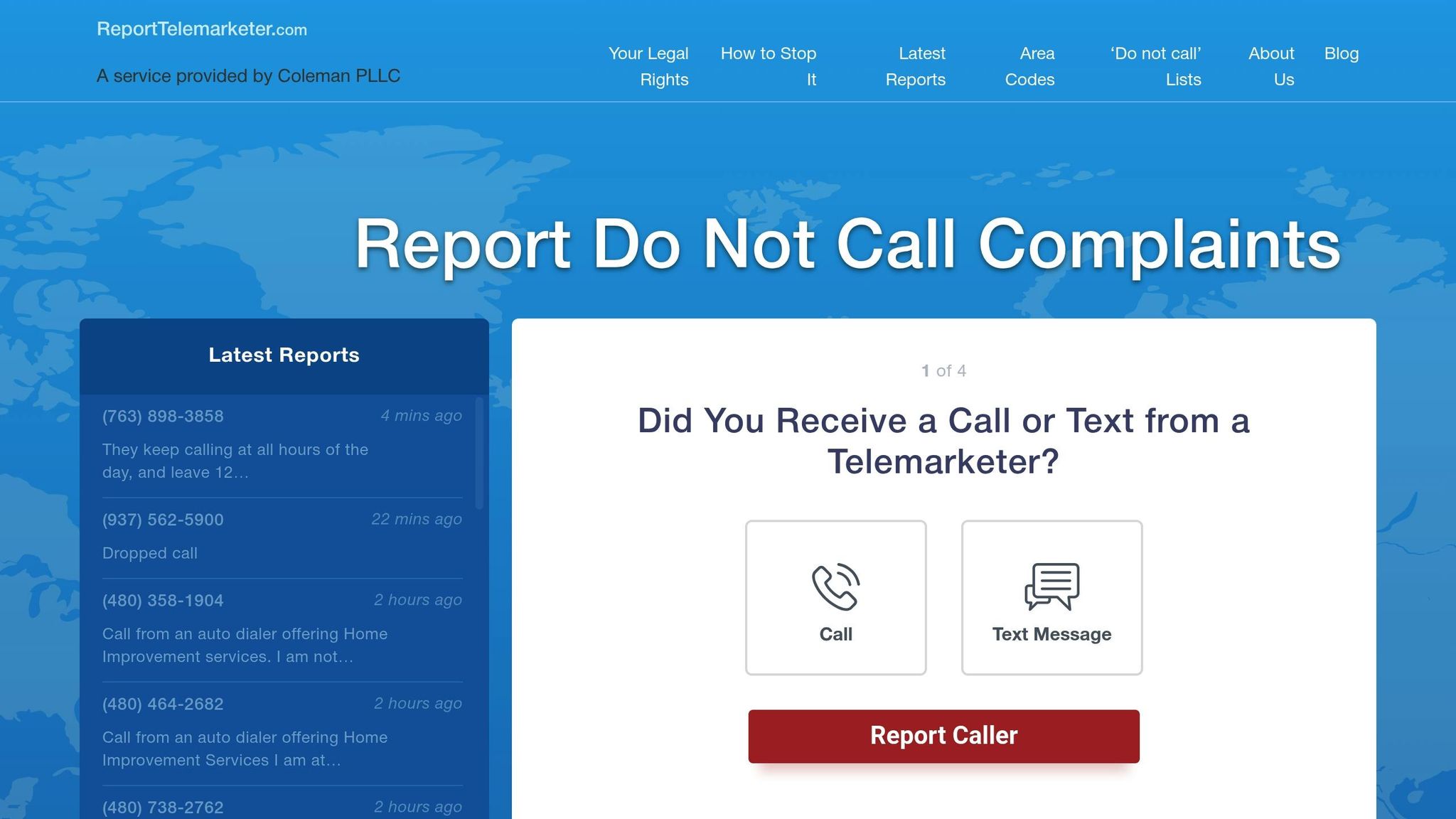
Florida’s Mini-TCPA is a state law designed to protect individuals from telemarketing calls and texts. It applies to anyone in Florida, including tourists and visitors, and regulates calls, texts, and voicemail messages. The law requires telemarketers to obtain prior written consent, include a "STOP" opt-out option in texts, and follow strict time and volume limits. Violations allow consumers to sue directly, with potential damages of $500 to $1,500 per violation. Recent updates have clarified consent rules, expanded the definition of autodialers, and introduced pre-suit notice requirements.
Key highlights:
- Covers phone calls, text messages, and voicemails aimed at selling goods or services.
- Applies to calls made to Florida area codes or individuals physically in Florida.
- Limits telemarketing to 8:00 a.m.–8:00 p.m. and no more than three contacts per day.
- Exempts certain entities like nonprofits, financial institutions, and political campaigns.
- Offers a private right of action with a four-year statute of limitations.
Consumers can document violations, file complaints, and seek help from services like ReportTelemarketer.com to hold telemarketers accountable.
Who and What Florida’s Mini-TCPA Covers
Who Gets Protection Under the Mini-TCPA?
Florida’s Mini-TCPA safeguards not just residents of Florida but also anyone physically present in the state when they receive unwanted telemarketing messages. This includes tourists, business travelers, and temporary visitors.
The law shifts the burden of proof onto telemarketers, requiring them to demonstrate that their calls were not directed at Florida consumers. As Image Building Media explains:
"If you call or text a Florida area code, the law presumes you’re contacting a Florida resident or someone physically in the state."
This law applies nationwide. Businesses across the United States – whether based in New York, California, or even overseas – must comply if they target individuals with Florida area codes.
Florida residents can take matters into their own hands if violations occur. The Mini-TCPA grants them a private right of action, enabling them to sue violators directly without waiting for government agencies to step in.
What Types of Communications Are Covered?
The Mini-TCPA governs "telephonic sales calls", which include phone calls, text messages, and voicemail communications aimed at selling consumer goods or services, offering credit, or gathering information for solicitation purposes.
Automated phone calls – whether live or pre-recorded – are covered under this law. This includes robocalls, which deliver pre-recorded sales pitches.
Text messaging is another key focus. Florida’s Mini-TCPA requires unsolicited marketing texts to include a "STOP" option, giving recipients an easy way to opt out of further messages. Companies that fail to provide this opt-out option or ignore stop requests may face penalties.
Voicemail messages sent directly to a recipient’s inbox without ringing their phone are also regulated. Telemarketers must obtain prior express written consent before sending these types of messages.
The law also defines and regulates automated dialing systems. According to 2023 amendments, automated systems are those that both select and dial numbers, distinguishing them from manual dialing methods.
Certain communications are exempt, such as debt collection calls, servicing calls, and messages to existing customers. Exemptions also apply to specific entities, including financial institutions, charitable and religious organizations, political campaigns, educational institutions, commercial banks, insurance brokers, and business-to-business interactions. However, some of these entities must file valid affidavits with the Florida Department of Agriculture and Consumer Services before engaging in such communications.
Florida Mini TCPA Law Explained: Contact Center Compliance Update | Convoso

How Florida’s Mini-TCPA Differs from the Federal TCPA
Both Florida’s Mini-TCPA and the federal TCPA aim to shield consumers from unwanted telemarketing, but they diverge in how they define consent and enforce regulations. These differences influence how consent is managed and how opt-out procedures are handled.
Digital Consent and Signature Requirements
Florida’s Mini-TCPA explicitly recognizes digital actions – like checking a box or replying to a text – as valid written consent. In contrast, the federal TCPA lacks specific guidelines on digital methods, treating texts as equivalent to mobile phone calls.
Consent Rules and Exemptions
Florida’s law takes a more detailed approach to consent. It requires prior express written consent for "unsolicited" telephonic sales calls, with exceptions for calls that respond to express requests or involve an existing business relationship. The federal TCPA, on the other hand, applies a broader consent framework, offering exemptions for emergency calls or those from tax-exempt nonprofit organizations.
Opt-Out Protocols
When it comes to opt-outs, Florida mandates a clear "STOP" option for text messages and allows a 15-day grace period before legal action can be taken. The federal TCPA also requires prompt opt-out compliance but provides up to 30 days and does not specify a particular format for opt-out requests.
Florida vs. Federal TCPA: Key Differences
The table below highlights the main distinctions between Florida’s Mini-TCPA and the federal TCPA:
| Aspect | Florida Mini-TCPA | Federal TCPA |
|---|---|---|
| Digital Consent | Recognizes digital actions like checking boxes | Does not explicitly address digital methods |
| Consent Scope | Focuses on "unsolicited" calls with defined exemptions | Broad framework with exceptions for emergencies or nonprofits |
| Text Opt-Out | Requires a "STOP" option with a 15-day grace period | Requires prompt compliance, format unspecified |
| Grace Period | 15-day window for text violations | Up to 30 days for do-not-call compliance |
| Enforcement | Allows consumers to sue directly | Primarily enforced by the FCC with limited private actions |
Enforcement and Consumer Protections
Florida’s Mini-TCPA gives consumers the power to take legal action directly, offering a private right of action. In contrast, the federal TCPA is mainly enforced by the FCC, with fewer opportunities for individuals to pursue private lawsuits.
These distinctions mean that Florida residents often have more straightforward legal protections and remedies under the Mini-TCPA. However, telemarketers operating in the state must navigate stricter compliance rules compared to federal standards.
Rules and Consumer Rights Under Florida’s Mini-TCPA
Florida’s Mini-TCPA sets clear boundaries for telemarketers, aiming to protect consumers from intrusive and excessive communications. Knowing these rules can help you identify when your rights have been violated.
Time and Volume Restrictions
Under Florida law, telemarketing calls and texts are restricted to specific hours: they cannot be made before 8:00 a.m. or after 8:00 p.m. in the recipient’s local time zone. For instance, if a Miami resident receives a telemarketing call at 7:30 a.m. or 8:15 p.m., it would be considered a violation of this rule.
Another key restriction involves the frequency of communications. Telemarketers are limited to no more than three calls or texts to the same person within a 24-hour period when using an autodialer. This limit applies even if the calls or texts come from different phone numbers. These safeguards are designed to give consumers the right to push back against excessive or unwelcome telemarketing practices.
sbb-itb-a8d93e1
How to Take Action Against Telemarketers
If you’re tired of telemarketers invading your peace, there are steps you can take to protect your rights and hold them accountable. Florida’s Mini-TCPA gives you the tools to fight back, but success starts with careful documentation and timely action.
Documenting and Reporting Violations
To build a strong case, systematically gather evidence of telemarketing violations:
- Request your phone records from your wireless carrier or landline provider.
- Highlight the calls to identify patterns of repeated violations over time.
- Maintain a detailed log for each unwanted call, noting the date, time, caller’s number, company name, and any requests you made to be removed from their list.
- Save voicemails left by telemarketers as direct evidence.
- Keep copies of any revocation notices you’ve sent, such as emails or certified mail receipts.
Once you’ve collected your evidence, file a complaint with the Florida Attorney General’s office using their online consumer complaint portal. This creates an official record and helps state authorities monitor problematic telemarketers.
Additionally, add your number to do-not-call registries. You can register with the National Do Not Call Registry through the Federal Trade Commission’s website. Check if Florida has a separate state registry as well. While these registrations won’t block every unwanted call, they strengthen your position if violations occur.
With your documentation in place, you can take the next step by tapping into expert resources.
Role of ReportTelemarketer.com

ReportTelemarketer.com provides a platform to help you combat telemarketing violations. The service investigates reported telemarketers and takes action to stop them.
Using advanced tools, the platform traces violations and pursues legal action. They may send cease-and-desist letters or file formal complaints to apply immediate pressure on telemarketers and end illegal practices.
The best part? The service is free for consumers. Any attorney fees are recovered directly from telemarketers when legal action succeeds, so financial constraints won’t stand in your way.
Your privacy remains protected throughout the process. While telemarketers may be publicly listed as a warning to others, your personal information stays secure.
If successful, the platform can also assist you in recovering monetary damages. Florida’s Mini-TCPA allows you to claim up to $500 per violation, or up to $1,500 per violation if the telemarketer knowingly and willfully broke the law. Keep in mind, the statute of limitations for these cases is four years.
Finally, educational resources provided by ReportTelemarketer.com can help you better understand your rights under telemarketing laws. By learning to identify and document violations, you’ll be better prepared to take action when necessary.
Recent Updates to Florida’s Mini-TCPA
Florida’s Mini-TCPA continues to evolve as lawmakers and courts respond to changes in technology and consumer expectations. These updates aim to give consumers more control while refining how the law is enforced, building upon the protections already in place.
Major Amendments
Recent legislative changes have introduced several key updates:
- Expanded Definition of Automatic Dialing Systems: The law now covers a broader range of technologies, keeping pace with advancements in telemarketing tools.
- Pre-Suit Notice Requirements: Consumers must now formally notify telemarketers before taking legal action, providing an opportunity for resolution before litigation.
- Clearer Consent Standards: The rules around consent for text messages and automated calls have been clarified to better protect consumers.
- Revised Penalty Provisions: Penalties have been adjusted to deter repeat offenders and address serious violations more effectively.
Legal Developments and Court Rulings
Florida courts have also stepped in to provide greater clarity on key aspects of the law:
- Consent Requirements: Recent rulings have reinforced and expanded the rights of consumers, ensuring companies adhere to stricter standards.
- Class Action Litigation: The updates have opened the door for more class actions, allowing consumers to challenge unfair practices collectively.
- Statutory Damages: Federal and appellate courts have clarified that consumers can seek statutory damages without needing to prove financial losses, making it easier to hold telemarketers accountable.
These legislative and judicial updates work together to strengthen consumer protections and provide more straightforward ways to address unwanted telemarketing practices.
Conclusion: Consumer Rights Under Florida’s Mini-TCPA
Florida’s Mini-TCPA provides strong protections for consumers against unwanted telemarketing calls and texts. It goes beyond federal regulations by covering a wider range of communications, requiring stricter consent, and allowing consumers to claim statutory damages without needing to prove financial loss. Recent updates have made these safeguards even stronger.
Knowing your rights and acting when telemarketers cross the line is essential to maintaining your privacy. The Mini-TCPA offers practical legal tools to combat unsolicited communications. Be diligent in documenting every violation, as this can be key to building a solid case if legal action becomes necessary.
For those who need additional support, help is available. ReportTelemarketer.com offers a free service to assist consumers in dealing with telemarketing violations. They investigate reported telemarketers, identify breaches of consumer protection laws, and can even send cease-and-desist letters or file complaints on your behalf – all at no cost to you. This service can be a valuable resource for taking control of unwanted communications.
FAQs
What evidence do I need to prove a telemarketer violated Florida’s Mini-TCPA?
Proving a Violation of Florida’s Mini-TCPA
To demonstrate that a telemarketer has violated Florida’s Mini-TCPA, you’ll need to collect solid evidence of the unsolicited contact. Here’s what to gather:
- Call logs: Record the date, time, and the telemarketer’s phone number.
- Call recordings: If you can, save recordings to document the content of the communication.
- Screenshots of text messages: Capture any messages or voicemail transcripts that you receive.
- Caller ID details: Note the information displayed to help identify the source.
Make sure to keep a detailed record of every interaction, noting the date, time, and nature of the contact. This documentation is key to building a strong case and showing a clear violation. If you’re not sure how to proceed, platforms like ReportTelemarketer.com can help investigate and address these unwanted calls or texts.
What makes Florida’s Mini-TCPA different from the federal TCPA, and how does it impact consumer rights?
Florida’s Mini-TCPA sets stricter guidelines than the federal TCPA, offering consumers more robust safeguards. One standout difference is its expanded definition of auto-dialers, which now includes a wider range of automated systems. Additionally, it shortens the window for telemarketing calls and texts, restricting them to 8:00 AM to 8:00 PM local time – an hour less than the federal rule, which allows until 9:00 PM.
These tighter regulations are designed to curb intrusive telemarketing practices, empowering consumers to push back against unwanted calls and texts. If you’re feeling overwhelmed by persistent telemarketing, tools like ReportTelemarketer.com can assist in protecting your rights and taking action.
What should I do if I get telemarketing calls or texts at odd hours or without my permission?
If telemarketing calls or texts are disrupting your peace – especially outside permitted hours or without your consent – there are steps you can take to regain control and minimize these interruptions:
- Add your number to the National Do Not Call Registry: This blocks many unwanted telemarketing calls. You can register online or by calling 1-888-382-1222.
- Report suspicious calls or texts: If you suspect illegal activity or spoofing, report the issue to the FCC or other relevant authorities.
- Use call-blocking tools: Many phone carriers and third-party apps offer features to filter out unwanted calls and texts.
These steps can help you cut down on unwanted communications. For persistent issues, you might also consider consumer protection services like ReportTelemarketer.com to address potential violations of telemarketing laws.